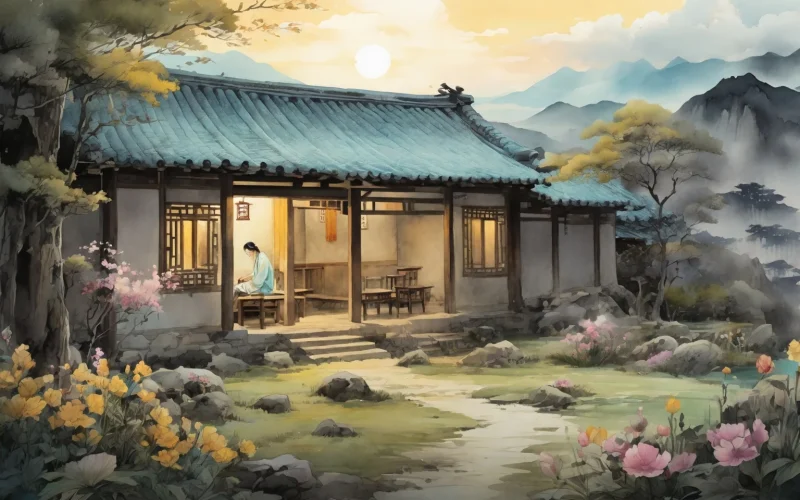Beyond the western hills sinks the sun white;
Over east ridge the moon sheds her pure light.
For miles and miles overflow the moonbeams;
The air is permeated with shadows and dreams.
With the west wind my lonely room is filled;
At dead of night my mat and pillow chilled.
In autumn’s breath I hear seasonal song;
On sleepless bed I feel the night so long.
I want to talk, but to whom to confide?
I drink to lonely shadow by my side.
The sun and the moon rise and fall with speed,
But where can I gallop at will my steed?
Thinking of this, I am so much depressed.
How could my mind all the night long find rest!
Original Poem
「杂诗 · 其二」
陶渊明
白日沦西阿,素月出东岭。
遥遥万里辉,荡荡空中景。
风来入房户,夜中枕席冷。
气变悟时易,不眠知夕永。
欲言无予和,挥杯劝孤影。
日月掷人去,有志不获骋。
念此怀悲凄,终晓不能静。
Interpretation
This poem was composed in 414 AD when Tao Yuanming was fifty years old, having lived in rural seclusion for many years. Having experienced turbulent social changes and an unsuccessful official career, though Tao's heart tended toward tranquility, he still often felt deep emotions about the passage of time and unfulfilled ideals during solitary nighttime reflections. The poem depicts the cold and desolate scenery of an autumn night, conveying the poet's sorrowful mood during sleepless nights and unrealized ambitions, revealing the loneliness and melancholy in his philosophical thoughts and emotional depths.
First Stanza: "白日沦西阿,素月出东岭。"
Bái rì lún xī ā, sù yuè chū dōng lǐng.
The white sun sinks behind western hills,
While the bright moon rises over eastern peaks.
Depicting the grand scene of celestial transition between sun and moon, inspiring the poet's contemplation of time's flow.
Second Stanza: "遥遥万里辉,荡荡空中景。"
Yáo yáo wàn lǐ huī, dàng dàng kōng zhōng jǐng.
Its radiance stretches ten thousand miles,
Filling the vast void with luminous scenes.
The boundless scenery mirrors the poet's boundless loneliness and thoughts.
Third Stanza: "风来入房户,夜中枕席冷。"
Fēng lái rù fáng hù, yè zhōng zhěn xí lěng.
Wind enters through doors and windows,
Chilling mat and pillow in night's depth.
Delicate description of autumn night's desolate chill hints at the poet's solitary situation.
Fourth Stanza: "气变悟时易,不眠知夕永。"
Qì biàn wù shí yì, bù mián zhī xī yǒng.
Air's change reveals season's turn,
Sleeplessness makes night's length known.
Perceiving seasonal changes leads to profound realization of life's brevity and nocturnal solitude.
Fifth Stanza: "欲言无予和,挥杯劝孤影。"
Yù yán wú yǔ hè, huī bēi quàn gū yǐng.
Wanting to speak but finding no echo,
I raise my cup to cheer my lone shadow.
Expresses profound loneliness with no companion to share one's thoughts.
Sixth Stanza: "日月掷人去,有志不获骋。"
Rì yuè zhì rén qù, yǒu zhì bù huò chěng.
Sun and moon cast mankind aside,
While aspirations find no galloping ground.
Directly states the poet's deep sorrow over unrealized ambitions and wasted years.
Seventh Stanza: "念此怀悲凄,终晓不能静。"
Niàn cǐ huái bēi qī, zhōng xiǎo bù néng jìng.
Thinking of this fills my heart with grief,
Through dawn's approach I find no peace.
Concludes the poem's emotions, expressing restless anguish over frustrated ideals and life's impermanence.
Holistic Appreciation
"Miscellaneous Poems II" reveals the poet's inner solitude and melancholy through depictions of moonlit autumn nights, cold winds and prolonged darkness. Using natural scenery as backdrop while incorporating genuine experiences of sleepless nights, Tao Yuanming seamlessly blends external coldness with internal loneliness. The endless night and solitary drinking highlight his helpless mood of unrealized ambitions with no outlet for expression. Facing time's passage and life's uncertainty, he expresses both powerless sorrow and profound self-reflection. With simple, natural language and enduring emotions, the poem demonstrates Tao's undiminished passion and deep feelings even in reclusive life.
Artistic Merits
This poem combines natural description with emotional expression to create a spacious, cold and lonely night atmosphere. Tao Yuanming excels at conveying complex emotional changes through simple, plain language, transitioning naturally from scenery to sentiment. The poem contains both grand depictions of cosmic phenomena and delicate portrayals of chilly solitude, allowing readers to feel profound life melancholy and temporal powerlessness in stillness. Using unadorned words, the poet expresses broad and deep life reflections, embodying his unique artistic style that is both mild and substantial.
Insights
This poem enlightens us that loneliness and sorrow inevitably arise when facing frustrated life ideals and relentless time. Yet as Tao Yuanming demonstrates, even in the loneliest nights, one should face reality with a clear and calm heart. Though life rarely meets expectations, maintaining one's aspirations and sentiments during cold, desolate nights constitutes life's most genuine and resilient light.
Poem translator
Xu Yuanchong (许渊冲)
About the poet

Tao Yuanming(陶渊明), 365 – 427 CE, was a poet, literary figure, fu writer, and essayist active during the late Eastern Jin and early Liu Song dynasties. Born in Chaisang (near present-day Jiujiang, Jiangxi Province), he pioneered a new genre of pastoral-themed literature, expressing profound philosophical insights through simple language. His poetic style became an enduring aesthetic standard in classical Chinese poetry.











